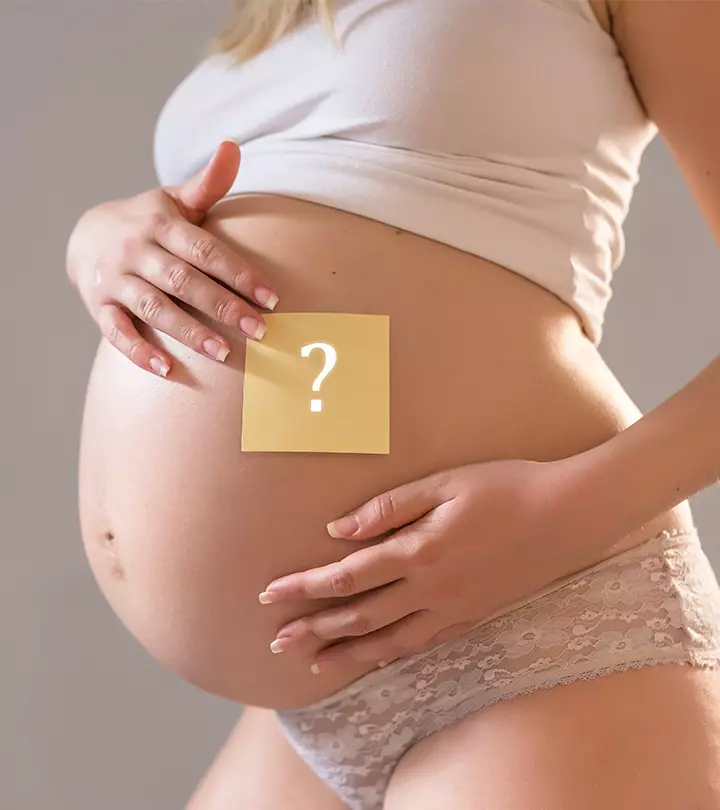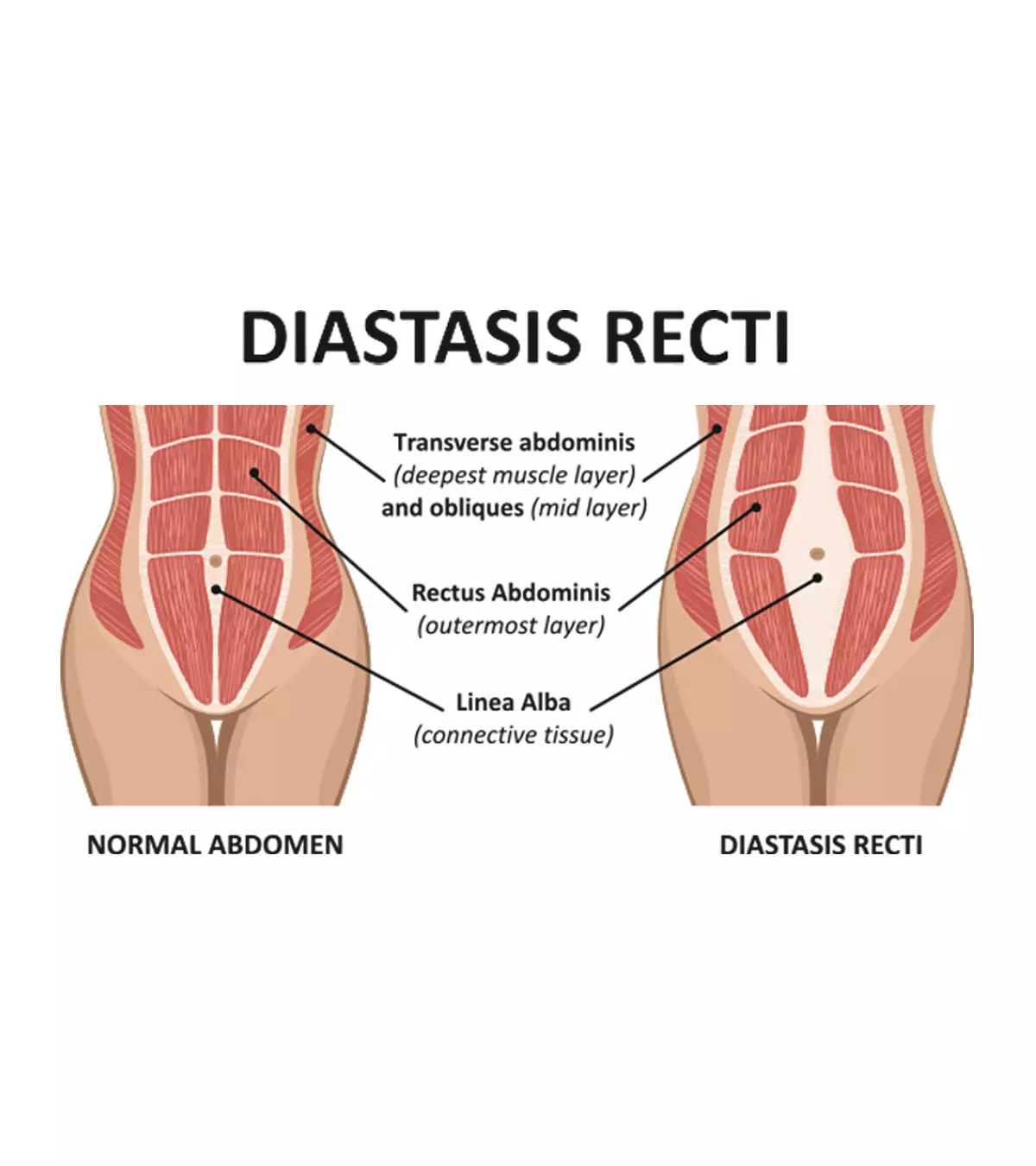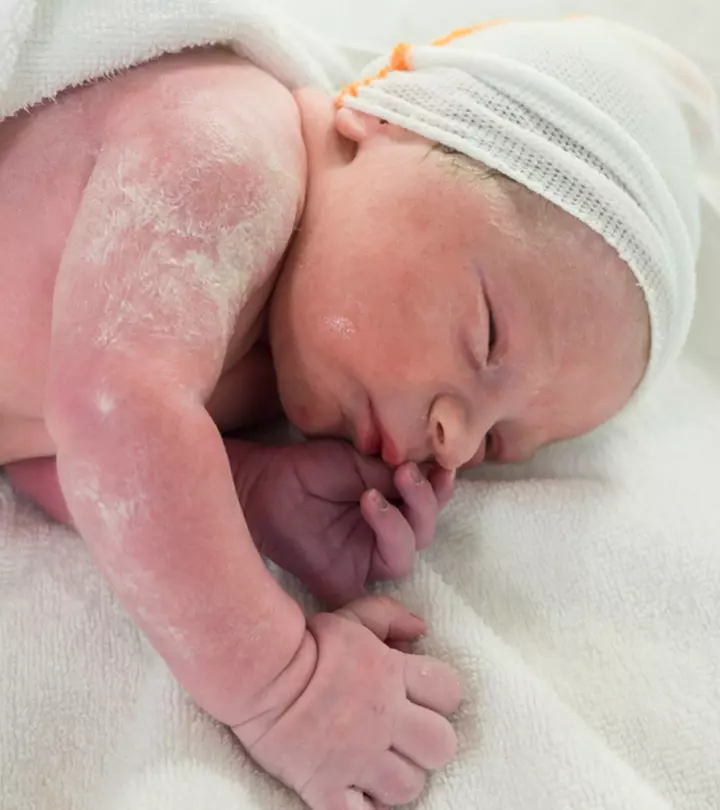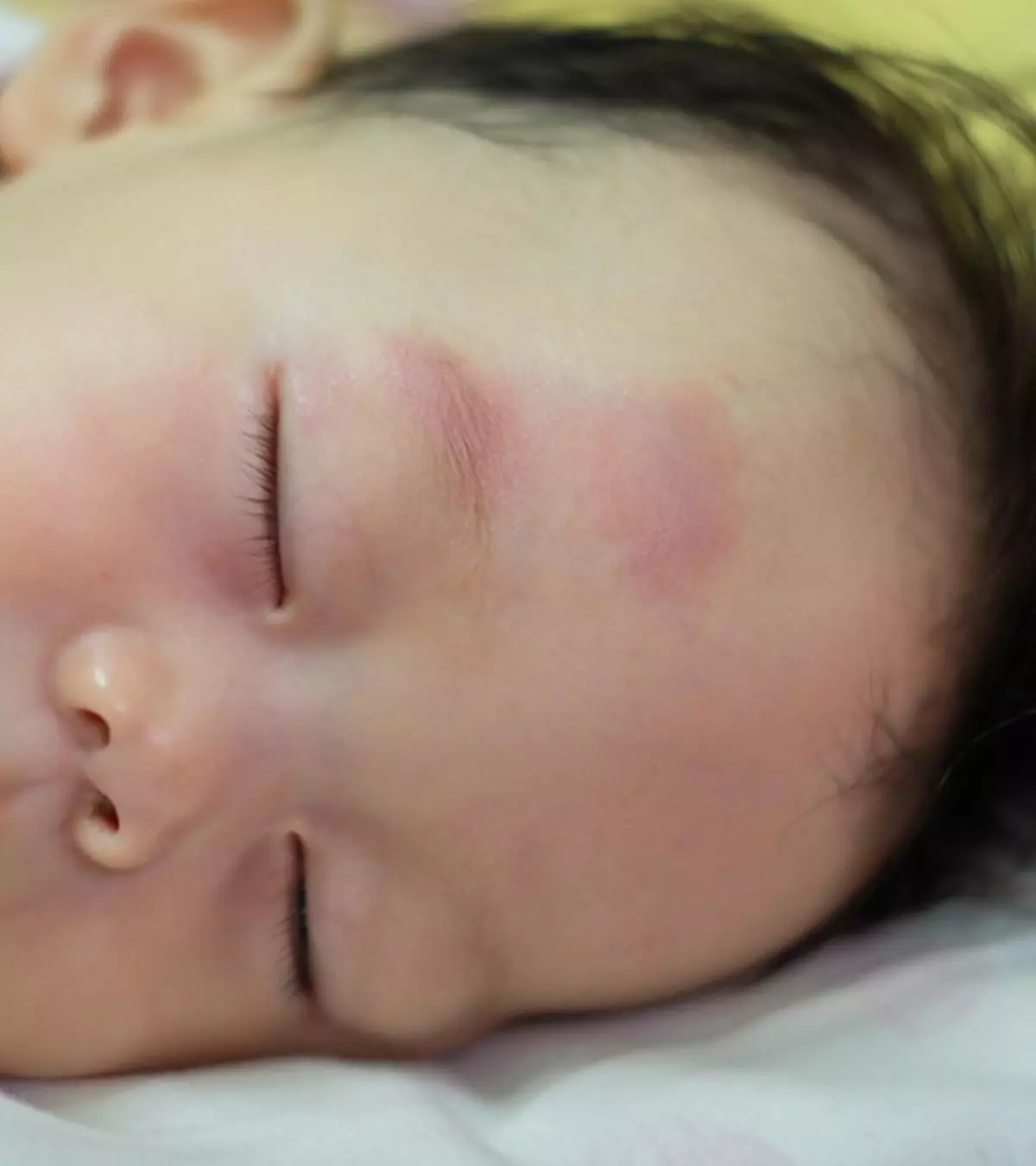
Image: iStock
A positive pregnancy test brings loads of unexpected events for a pregnant woman. Along with impending nausea and fatigue, changes in our gustatory system can cause a common metallic taste in the mouth during pregnancy (1).
The general change in the taste is called dysgeusia and is commonly seen along with the symptoms of fatigue and nausea (1). This abnormal taste perception usually occurs during the first trimester and feels similar to having coins in the mouth or a taste that is hard to describe. Metallic taste in the mouth is a harmless condition and is rarely a cause for concern (2).
Read through the post to learn the onset, causes, and management of metallic taste in the mouth during pregnancy.
Key Pointers
- The metallic taste emerges at any time during the first trimester, even when you aren’t eating or drinking.
- If you have dry mouth or mouth pain along with the metallic taste, consult your doctor.
- Pregnancy-related hormonal fluctuations are the primary cause of metallic taste in pregnant women.
- Eating acidic foods, chewing mint-flavored gum, and drinking plenty of water can help manage the metallic taste.
Is It Normal To Have A Metallic Taste In Your Mouth During Pregnancy?

Image: Shutterstock
Dysgeusia is a normal and common pregnancy symptom. It is frequently seen in most pregnant women, with most reporting at least some changes in taste during pregnancy (1). It is not a cause for concern. Nevertheless, you may inform the doctor about it, especially if the metallic taste is accompanied by other symptoms such as pain in the mouth or dry mouth during pregnancy.
When Does The Metallic Taste Start During Pregnancy?
The metallic taste mostly starts to appear in the first trimester (first 12 weeks of pregnancy). This change in taste is sudden or maybe felt randomly at any time of the day, even without eating or drinking (3). You may also have other flavor or taste-related sensations or increased sensitivity to certain tastes. For instance, a few studies have shown an increased sensitivity to bitter taste during pregnancy, although this may vary from one pregnant woman to another (4).
A mom blogger anonymously recounts her encounter with a metallic taste in her mouth while pregnant. She expresses, “Soon after I found out I was pregnant, I developed a strange metallic taste in my mouth called dysgeusia. It changed the taste of everything I ate and stayed with me at all times. Just imagine sucking on a copper flavored lollipop. Ugh! As a lover of food, this was a no-go for me, but there was nothing I could do about it. Luckily, it faded away after my first trimester (i).”
What Causes Metallic Taste During Pregnancy?

Image: Shutterstock
There is no specific reason for metallic taste during pregnancy, and many pregnant women may not experience it at all. Dysgeusia and a metallic taste in pregnancy may most likely occur due to the following factors.
- The altered levels of pregnancy hormones may affect the taste buds’ functions and heighten sensitivity to certain flavors, contributing to metallic taste in pregnancy.
- A change in the sense of smell is also connected to taste alterations and food aversions during pregnancy (5). These could occur due to the effects of hormones. Consequently, some women have strong food cravings during pregnancy, which may increase the chances of a strange metallic sensation in the mouth. It may be due to iron supplements.
Non-pregnancy-related factors may include medications, gum infection, cold, and sinus infection (2).
 Quick fact
Quick factWhen Can You Expect The Metallic Taste To End?
Dysgeusia is most common in the first trimester. The taste buds return to normal once the hormones begin to settle down. In some women, the metallic taste might be present throughout the pregnancy with decreased severity. Dysgeusia in pregnancy is not serious, as long as it doesn’t affect the appetite of pregnant women. There is no treatment required as the condition gets better with the progression of pregnancy (5).
 Point to consider
Point to considerHow To Tackle Dysgeusia During Pregnancy?
Having an unpleasant or bad taste can be awful during pregnancy. Though one cannot prevent the incidence of dysgeusia, certain measures may help ease the discomfort.
Asha Chohan details her encounter with the unpleasant metallic taste in her mouth during pregnancy on her blog. She recalls, “Hands up if you know what I mean by that ‘metallic’ taste on your tongue. Oh, the things we’d do to get rid of that revolting taste! My way to go was ice lollies! Any time I felt this taste in my mouth and my mouth started to feel really dry, I’d treat myself to an ice lolly. My husband filled our freezer with fruit pastel ice lollies as that’s all I wanted. They totally got rid of that awful metallic taste that sat on my tongue most days (ii)!”
Here are some tips to combat the metallic taste in pregnancy.
- Acidic foods, such as citrus fruits, pineapples, and green apples, may cut through the metallic taste. Also, try adding vinegar to your foods or drinks.

Image: Shutterstock
- Brush your teeth twice a day (with toothpaste containing baking soda) followed by thorough tongue cleaning.
- Rinse your mouth with a mild oral salt solution periodically.
- Chew a minty gum to increase saliva production, which helps to wash away the bitterness in the mouth.
- Drink lots of water to ease the symptoms.
- Certain prenatal vitamins may have high iron content, making this condition worse. Talk to your doctor if you feel the prescribed medicines are worsening your condition (6).

Image: Shutterstock
Frequently Asked Questions
1. Can dehydration cause a metallic taste in the mouth during pregnancy?
There are no scientific studies to prove that dehydration can lead to a metallic taste during pregnancy. However, consult your doctor if you feel dehydrated and have a metallic taste in your mouth.
2. Can vitamins cause a metallic taste in the mouth?
If you take multivitamins with zinc, chromium, calcium, or copper, you may experience a metallic taste in the mouth. However, you need not worry about this abnormal taste because it will resolve as soon as your body processes these vitamins. If the taste persists, talk to your doctor about the dosage (7).
3. Can certain foods or drinks contribute to metallic taste in the mouth during pregnancy?
This metallic taste in your mouth has nothing to do with the food you consume. If you consume citrus fruit it can actually help you get rid of the metallic taste but like everything else make sure to consume everything in moderation after you have consulted your doctor.
4. Can metallic taste in the mouth during pregnancy affect the baby?
The metallic taste caused by a surge of pregnancy hormones is usually considered a temporary condition that poses no threat to the mother and the baby and clears up by itself (2).
5. Can anxiety or stress contribute to a metallic taste in the mouth during pregnancy?
No direct scientific studies link anxiety to metallic taste. However, stress is known to exacerbate certain pregnancy symptoms, which may include morning sickness, loss of appetite, and dysgeusia. Thus, pregnant women experiencing anxiety should consult their healthcare provider for support.
Experiencing a metallic taste in the mouth during pregnancy is common and thus should not be a cause for concern. It usually occurs due to the hormonal changes the body goes through during this period. The symptoms of this condition can be managed with the help of simple diet changes and healthy lifestyle tips such as brushing twice a day, staying hydrated, and chewing gum. However, if your symptoms seem severe and are interfering with your food intake, consult your doctor at the earliest.
Infographic: Seeking Your Dentist’s Help To Manage The Metallic Taste
A metallic taste in the mouth is one of the many unusual and weird side effects of pregnancy. While it may not be preventable, your dentist may help curb its severity. Find management options for metallic taste during pregnancy in this infographic. Illustration: Momjunction Design Team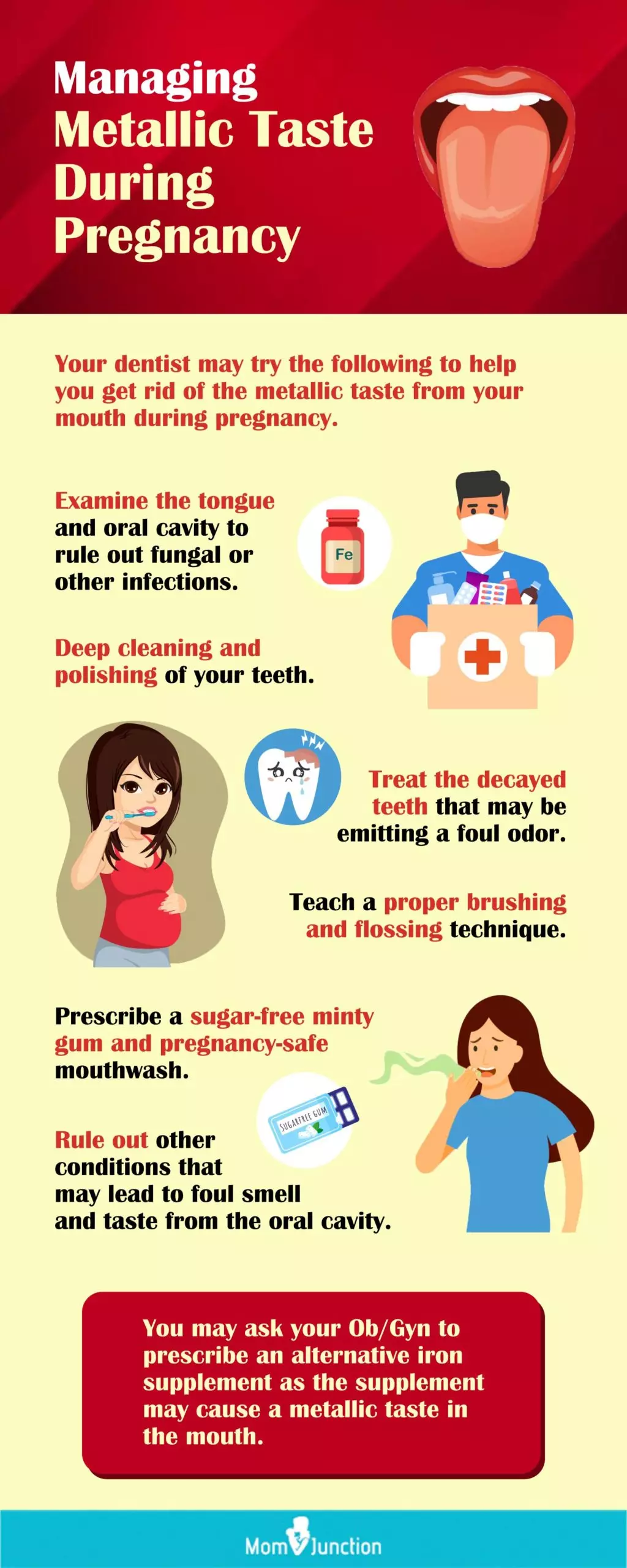
Personal Experience: Source
MomJunction articles include first-hand experiences to provide you with better insights through real-life narratives. Here are the sources of personal accounts referenced in this article.
i. 7 real pregnancy truths.https://addictedtomommyhood.wordpress.com/2017/07/01/7-weird-pregnancy-truths/
ii. My first trimester – Baby Cho Cho.
https://ashachohanblog.wordpress.com/2017/10/19/my-first-trimester-baby-cho-cho/
References
- Kuga M. et al., Changes in gustatory sense during pregnancy.
https://www.tandfonline.com/doi/abs/10.1080/00016480260046544 - Metallic taste in the mouth.
https://www.nidirect.gov.uk/conditions/metallic-taste-mouth - Pregnancy: Am I Pregnant?
https://my.clevelandclinic.org/health/articles/9709-pregnancy-am-i-pregnant - V.B. Duffy et al., Taste changes across pregnancy.
https://pubmed.ncbi.nlm.nih.gov/9929689/ - 5 weird pregnancy symptoms you might not know about.
https://utswmed.org/medblog/weird-pregnancy-symptoms/ - Dysgeusia Symptoms and Remedies.
https://americanpregnancy.org/healthy-pregnancy/health-nutrition/dysgeusia-symptoms-and-remedies/ - Common Causes for a Metallic Taste in Your Mouth.
https://health.clevelandclinic.org/common-causes-for-metallic-taste-in-your-mouth
Community Experiences
Join the conversation and become a part of our nurturing community! Share your stories, experiences, and insights to connect with fellow parents.
Read full bio of Dr. Richa Hatila Singh
Read full bio of Vidya Tadapatri
Read full bio of Rebecca Malachi
Read full bio of Dr. Joyani Das





